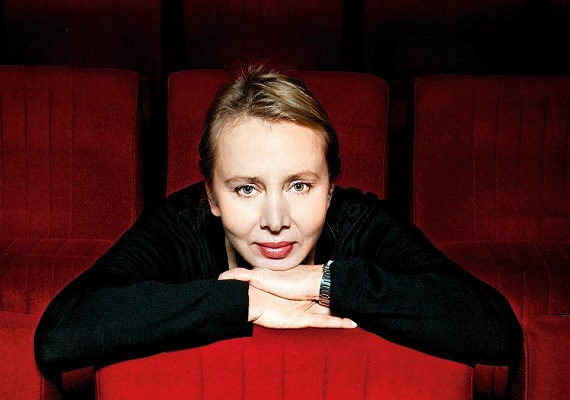SAN SEBASTIÁN 2017 Competition
Urszula Antoniak • Director
"The film traces a certain progression towards awareness"
- Dutch-Polish director Urszula Antoniak talks about her latest film, Beyond Words, at the Les Arcs European Film Festival

Well-known for Nothing Personal [+see also:
film review
trailer
interview: Urszula Antoniak
interview: Urszula Antoniak
film profile] (Best Debut Film at Locarno in 2009), Code Blue [+see also:
trailer
film profile] (Directors' Fortnight 2011) and Nude Area [+see also:
film review
film profile], the Dutch-Polish director Urszula Antoniak is in competitionat the 9th Les Arcs European Film Festival with her fourth feature film, Beyond Words [+see also:
film review
trailer
interview: Urszula Antoniak
film profile], unveiled at Toronto and well-received in competitionat San Sebastian.
Cineuropa: What was the main subject matter you wanted to deal with in Beyond Words, a film that has been very well-received formally, and in which you play with a theme of relative obscurity?
Urszula Antoniak: The idea for the film originated in 2007. I wanted to make a film about something I’m familiar with, because that's how I do things. In this particular instance, I was thinking of making a film about immigration as a fait accompli rather than a social film. I then realised that there was something in particular that hasn't changed for ten years, immigration films usually involve refugees portrayed as victims or as people who need to integrate. I have never seen a film in which the immigrant is fully integrated, in which he/she has none of the problems that affect the immigrants that we usually see in films.
Another important aspect to my film is that it doesn’t deal with economic immigration, but with immigration by choice. My main character chose to leave Poland and reinvent himself in Berlin, Germany. It's like Stendhal's Le Rouge et Noir, in which the character not only wants to belong to the aristocracy, but really believes that he deserves to evolve among the aristocrats and does not deserve a status tied to his birth at all. In Beyond Words, after having worked very hard to master the German language and to finish his studies to be a lawyer, the main character thinks that he deserves, that it is his right, to be treated like a German and to be seen as German. He does not want to be seen as an immigrant. The film opens with both ends of the spectrum of the experience of immigration: on the one hand, we see a European immigrant, white, blond, who can blend easily into any European country, and on the other hand a black man who can not easily blend into society and who will always have his otherness on show.
The totally unexpected reappearance of the father plays a triggering role.
It's not a film about a father-son relationship, but it opens the main character up to the child that’s within him. This child emigrated saying to himself that he would become so strong that his substitute father, Germany, would like him, before realising that although this substitute father accepts him, he does not like him. Ultimately, he discovers that the only place he really belongs is Berlin, because there are so many people like him, immigrants, travellers, etc. In general terms, the film traces a certain progression towards awareness.
Poet and lawyer, refugee and a free man, boss and a friend, Poland and Germany, etc., the film plays a lot on duality and antagonisms. Did this approach motivate your choice to shoot the film in black and white?
Black and white is often an aesthetic choice, but not in this case, because it actually ties in with these opposing themes, these dramatic contrasts that flow through the entire film. Moreover, in post-production, we actually accentuated the visual contrasts. And when you shoot in Berlin in black and white, the architecture of buildings begins to talk to you, it's somewhat reminiscent of Albert Speer.
You're also participating in the Coproduction Village at Les Arcs with your new project, Stranger. Can you tell us a bit about it?
It's also about a lawyer. It starts as a love affair before drastically becoming a thriller, with suspense that is intrinsically linked to trust, because when trust disappears, everything is open to invention. The film will evolve into a melodrama. This time it will be shot in colour, with passion and love, from the point of view of a woman who loves this kind of over-integrated immigrant, and will ponder the question of what kind of romantic relationship you can have with someone, when you only know what they tell you about themselves. Because you don’t have any context, you will never know their past, and everything they tells you takes on the form of fiction or a story. Sometimes we even prefer to tell people what they want to hear rather than the truth... If all goes well in terms of financing, I think I'll shoot the film in Berlin in 2019.
(Translated from French)
Did you enjoy reading this article? Please subscribe to our newsletter to receive more stories like this directly in your inbox.















